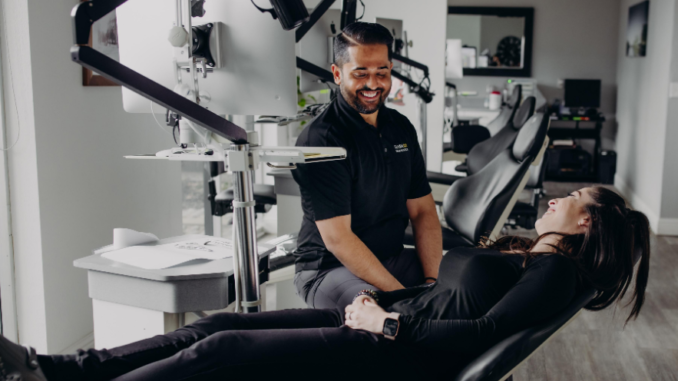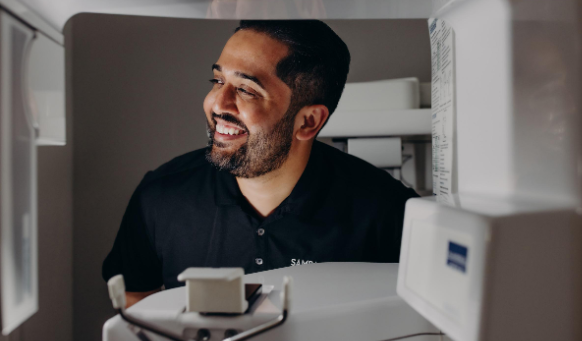
Manjeet Samra was born and raised in Lodi. But his parents and other family members migrated to Stockton in the 1980s from Punjab, the Indian state near the Pakistan border often targeted by extremists. Self-sustainment was the family’s priority in California; orthodontic care wasn’t apriority. But when Samra was a student at UC Davis he used his extra income to get the wide gap in his two front teeth fixed. It changed his life and lead to his satisfying career. Manjeet, or Mickey, 36, who graduated from Sierra High School in Manteca, didn’t know his properly aligned teeth would launch his passion for orthodontics. But with returning to his home town area as a priority, Dr. Samra, DDS, is the founder and owner of Samra Orthodontics. The 20-person business has offices in Stockton and Modesto. While marketing and website references often identify Samra as Dr. Mickey, the pseudonym isn’t a nickname based on his Indian first name. It’s a nickname he acquired in his youth. Samra’s parents were fond of Mickey Mouse. “Around the office and with friends and family, I’m Mickey, “he says, chuckling. “But patients call me Dr. Samra. “Now nearing a decade in his practice, Samra’s focus is offering what his parents couldn’t. “It was out of reach, Manjeet recalls of his non-dentistry youth. “My parents were working hard to make a life here, have a home, and put food on the table. Just like every other kid, you get told when your teeth aren’t straight. I was no different. I was 20 or 21 when I did it; my confidence grew. I got more attention and felt pretty good about it. “While he wasn’t immediately interested in further pursuing his new interest, the recent new father soon realized the importance of orthodontics in his life. He longed to help others who may have been similarly affected. Manjeet switched interests from exercise biology at UC Davis to seven additional university years of study. He trained in dentistry for four years at UC San Francisco and then had three years of residency at the University of Pittsburgh in Pennsylvania. “I focused my attention on making sure I came back here to do something that’s impactful,” he says. “I’ve spent nearly my whole life here. My family is here, and I want to be here. “Knowing his upbringing didn’t include financial leeway for dental visits, Samra now does for patients what his parents couldn’t do for him. “That’s the best part of what I do, ”he says. “It’s usually a long commitment; It’s one to two years of process. We get to see a lot of kids grow up in their most formative years. They’re family. You get to see them change. “Their smiles change. They grow up the tiny little things from when they first see us. I’m6-foot-1and some kids are now hovering over me by the time we’re done. They are standing in front of a mirror and seeing how things look. That’s the most remarkable part, just seeing the looks on their faces. There’s usually a lot of tears and joy, hugging and high-fiving involved. “Manjeet remembers his awkwardness and it’s prompted his want to help those in financial need. A major commitment in his practice is helping children whose families can’t afford orthodontic care. He collaborates with non-profits including the Mary Graham Children’s Foundation and the Child Abuse Prevention Council, both in Stockton. “The board of directors from these organizations know we are always looking for kids who are in need, “Manjeet says of his pro bono work. “We can address stuff when they are not in a position to get it addressed and have to wait until they’re in their 20s or later in life to get it addressed. It can be much more impactful when it’s done when they’re young. “The community support to provide free service previously had a qualification process, but it’s no longer required. If a child’s family can’t afford orthodontic care, Manjeet says they’re welcome as new patients. “There are lots of studies that show the benefits you see from a confidence level, ”he says. “It’s across the board. It’s not just about cosmetics; it’s about improving mental health, dental health, and a lot of stuff. “Social media has also helped young patients adapt to braces. “With the emergence of TikTok and Instagram, it’s almost a point where kids want this stuff, “Manjeet says. “They want these things on their teeth; they want to change colors. They’re sharing it on their social media pages and sharing how they coordinate their outfits for the day. “It’s all fine with Manjeet. He understands. “Sometimes, the kids don’t even realize there’s a benefit aside from changing the colors of their brackets,” he says. “It’s just very rewarding when they see the results.”


